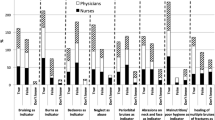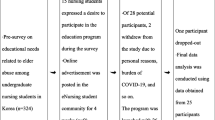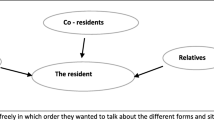Abstract
Elder abuse appears to be widely underestimated by health professionals. We aimed to evaluate the recognition of elder abuse among Italian nurses and nursing students related to their professional, personal experiences and socio-demographic characteristics. 193 nursing students and 76 nurses attending a post-graduate nursing management master’s degree at the University of Bologna (Italy) completed the Caregiving Scenario Questionnaire measuring the ability to recognize elder abuse. Data on age, gender, previous professional and personal experiences as well as nursing school teaching were collected. Regarding abusive items, preventing elder’s movements by putting a table over the elder’s lap was identified by almost all participants, while locking someone at home was identified by half of them. Neglect was recognized by 25 % of nurses and 20 % of students, respectively. The majority of nurses and students correctly identified non-abusive strategies. Reporting being taught on elder abuse was inversely associated with a good performance in detecting neglect. Italian nurses’ and nursing students’ uncertainty in identifying abusive strategies, especially neglect, was consistent with results of previous studies in other countries. Standardized education in healthcare core curriculum, reference guidance and training are strongly needed to improve elder abuse recognition in Italy.
Similar content being viewed by others
References
World Health Organization (2008) A global response to elder abuse and neglect: building primary health care capacity to deal with the problem worldwide: main report. WHO, Geneva
Dow B, Joosten M (2012) Understanding elder abuse: a social rights perspective. Int Psychogeriatr 24:853–855. doi:10.1017/S1041610211002584
United Nations (2002) Abuse of older persons: recognizing and responding to abuse of older persons in a global context. United Nations, New York
National Center on Elder Abuse (1998) National elder abuse incidence study. American Public Human Services Association, Washington, DC
World Health Organization (2011) European report on preventing elder maltreatment. WHO Regional Office for Europe, Copenhagen
World Health Organization (2002) World report on violence and health. WHO, Geneva
Mysyuk Y, Westendorp RG, Lindenberg J (2013) Added value of elder abuse definitions: a review. Ageing Res Rev 12:50–57. doi:10.1016/j.arr.2012.04.001
Penhale B (2010) Responding and intervening in elder abuse and neglect. Ageing Int 35:235–252. doi:10.1007/s12126-010-9065-0
Cooper C, Selwood A, Livingston G (2009) Knowledge, detection and reporting of abuse by health and social care professionals: a systematic review. Am J Geriatr Psychiatry 17:826–838. doi:10.1097/JGP.0b013e3181b0fa2e
Department of Health and Home Office (2000) “No Secrets” guidance on developing and implementing multi-agency policies and procedures to protect vulnerable adults from abuse. The Stationery Office, London
Selwood A, Cooper C, Livingston G (2007) What is elder abuse—who decides? Int J Geriatr Psychiatry 22:1009–1012. doi:10.1002/gps.1781
Thompson-McCormick J, Jones L, Cooper C, Livingston G (2009) Medical students’ recognition of elder abuse? Int J Geriatr Psychiatry 24:770–777. doi:10.1002/gps.2209
Hempton C, Dow B, Cortes-Simonet EN, Ellis K, Koch S, LoGiudice D, Mastwyk M, Livingston G, Cooper C, Ames D (2011) Contrasting perceptions of health professionals and older people in Australia: what constitutes elder abuse? Int J Geriatr Psychiatry 26:466–472. doi:10.1002/gps.2549
Ogioni L, Liperoti R, Landi F, Soldato M, Bernabei M, Onder G (2007) Cross-sectional association between behavioral symptoms and potential elder abuse among subjects in home care in Italy: results from the Silvernet study. Am J Geriatr Psychiatry 15:70–78. doi:10.1097/01.JGP.0000232511.63355.f9
Molinelli A, Viale L, Landolfa MC, De Stefano F (2011) Old age as an “alternative” to illness: gerontological and medico-legal aspects. Aging Clin Exp Res 23:148–152
Cooper C, Huzzey L, Livingston G (2012) The effect of an educational intervention on junior doctors’ knowledge and practice in detecting and managing elder abuse. Int Psychogeriatr 24:1447–1453. doi:10.1017/S1041610212000403
Caciula I, Livingston G, Caciula R, Cooper C (2010) Recognition of elder abuse by home care workers and older people in Romania. Int Psychogeriatr 22:403–408. doi:10.1017/S104161020999161X
Daly J, Coffey A (2010) Staff perceptions of elder abuse. Nurs Older People 22:33–37
Thomson AM, Beavan JR, Lisk R, McCracken LC, Myint PK (2010) Training in elder abuse: the experience of higher specialist trainees in Geriatric Medicine in the UK. Arch Gerontol Geriatr 51:257–259. doi:10.1016/j.archger.2009.11.012
Lo SKL, Lai CKY, Tsui CM (2010) Student nurses’ perception and understanding of elder abuse. Int J Older People Nurs 5:283–289. doi:10.1111/j.1748-3743.2009.00196.x
Acknowledgments
We thank the nursing students and nurses who participated in the study and tutors who facilitated the investigation.
Conflict of interest
On behalf of all authors, the corresponding author states that there is no conflict of interest.
Author information
Authors and Affiliations
Corresponding author
Rights and permissions
About this article
Cite this article
Pelotti, S., D’Antone, E., Ventrucci, C. et al. Recognition of elder abuse by Italian nurses and nursing students: evaluation by the Caregiving Scenario Questionnaire. Aging Clin Exp Res 25, 685–690 (2013). https://doi.org/10.1007/s40520-013-0087-9
Received:
Accepted:
Published:
Issue Date:
DOI: https://doi.org/10.1007/s40520-013-0087-9




